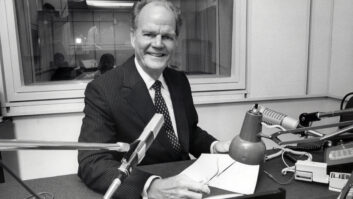
Rock programming consultant Fred Jacobs took bloggers to task over the recent item, carried by trades and blogs, that “Apple is rejecting all single-station radio apps.”
The real story was that Apple apparently is rejecting only certain apps. Jacobs blogged about this — which he realizes is ironic — because his company JaccApps found itself “embroiled” in the story, which Fred says turned out to be untrue.
“Various organizations and sites simply reprinted what was out there without bothering to check the facts,” according to Jacobs.
Jacobs’ account, “The Anatomy of a Controversy,” is a fascinating look at how the story got started, repeated and, over the Thanksgiving holiday weekend, took on a life of its own before accounts began to be published to correct the original slant.
So, what does this all mean, he asks?
“First and foremost, when you read an incendiary headline, check to see if the most important sources are quoted. And second, don’t jump to conclusions when you simply see the same story repeated numerous times without additional perspective or comment.
“Finally, determine which news providers can be trusted to provide you with the facts and not just opinion or hyperbole.”
Jacobs worries that the end of journalism as we’ve known it is closer than he thought. He does point out that bloggers just repeated the story without adding to it or checking it more thoroughly. He does credit the radio trade press with doing a better job than most.
To give you the full story of what Radio World did: We published the original comments from developer Jim Barcus in the form of a letter, not a news story. That letter had been sent to several trade publications. RW headlined it “Radio App Developer Unhappy With Apple.” Editor in Chief Paul McLane points out that the headline is accurate, and that we did not report Barcus’ assertions as fact, presenting them instead as his viewpoint; but he believes we should have asked Apple sooner than we did for reaction.
We did get quick comments from Jacobs; overall, we did a “next day” type of story due to the timing of the holiday and our work process. We were not among those reporting that Apple was rejecting all single-station apps, only that someone had raised this question; but Paul feels in hindsight that we should have been quicker in seeking a response. We did post a followup story immediately after the holiday, reporting on subsequent reaction to the flareup.
Paul and I remain committed to making sure RW’s news coverage is complete and that accuracy is not trumped by haste. We both agree with Jacobs’ comments about how to approach all content you read.
I have to agree with Jacobs on what he’s writing about bloggers too. Responsible publications might trip up from time to time. But, as another program consultant said to me here at the Arbitron meeting in Baltimore this week: “Blogging is mostly crap. It’s not journalism. No one is checking facts.”
And this is why I oppose the trend at trade shows I’m seeing where bloggers are given credentials, and in some cases, their own workspace — just like professional, experienced reporters. Don’t get me started on how bloggers are not credible journalists.







